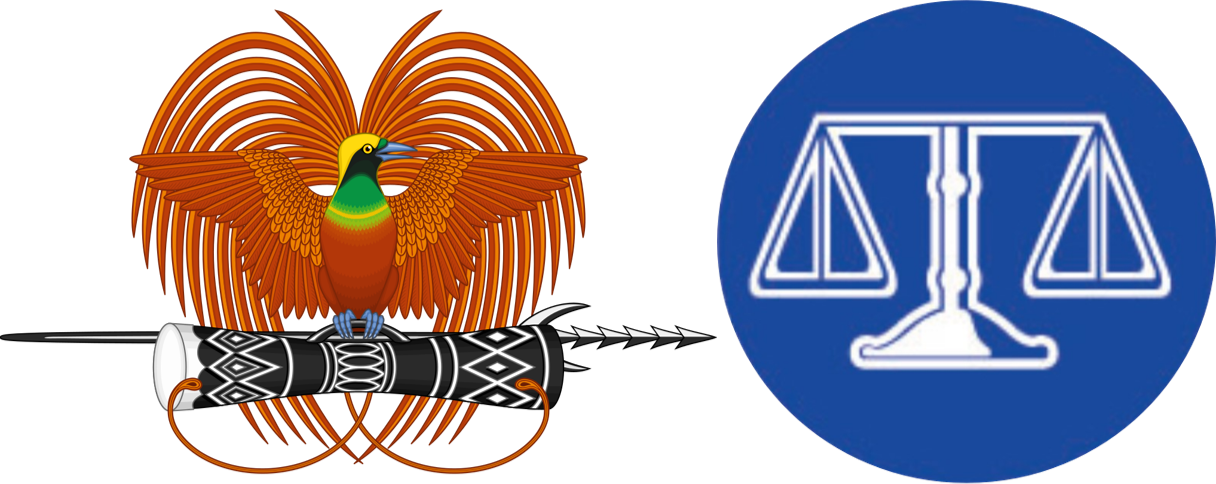The Law & Justice Sector Secretariat (LJSS) is a branch of the Department of Justice & Attorney General under the National, Provincial Coordination and Crime Prevention Division (NPCCPD) headed by Deputy Secretary Mr. Stanley Raka. The Secretariat’s core functions are:
- Coordination, Communication and Collaboration of the Law & Justice Sector and its Agencies.
- Implementing the Social, Law and Order Sector (SLOS) Strategic Framework 2019 – 2022 as the SLOS Secretariat.
Coordination, Communication and Collaboration of the Law & Justice Sector and its Agencies
Guided by the Law and Justice Sector Policy, the Law and Justice Sector Secretariat is the governance mechanism responsible for the implementation of the Law and Justice Sector Strategic Framework by effectively coordinating strategies and activities through robust collaboration and communication of the Law and Justice Sector Agencies. The Law and Justice Sector Policy’s main theme include:
- Improved functioning of the formal Law and Justice Agencies to increase the effectiveness of the deterrence system and maintain the rule of Law; and develop partners with the informal Sector to deliver services.
- Improved Sectoral Coordination to target priorities, effeciency and improved operational performance; and
- Increased focus on Crime Prevention and Restorative Justice and developing the informal system as a complementary part of PNG’s Law and Justice Framework.
The Law and Justice Sector covers a vast range of functions including policing, corrections, the judiciary and the courts, prosecutions, defending those accused of crime, land dispute resolution, the management of estates and insolvency, the training of lawyers, investigation of corruption and leadership abuses and legal advice to Government and the State by:
Improved policing, security, safety and crime prevention
Increased access to justice and just results
Improved reconciliation, reintegration and deterrence
Improved accountability and reduced corruption
Improved ability to deliver law and justice services
Implementing the Social, Law and Order Sector (SLOS) Strategic Framework 2019 – 2022 as the SLOS Secretariat

Creating a secure, peaceful and prosperous Christian nation by providing an enabling environment with opportunities for sustainable economic growth and accessible services at all levels.
Take Back Papua New Guinea and make it the Richest Black Christian nation where no child is left behind.

The Secretariat is responsible for monitoring and evaluating progress in implementing the Strategic Priorities based on the review and reporting process, anchored in the Monitoring and Evaluation Framework of this Strategy, culminating in the annual review of activities. The Strategic Priorities apply to all officers working in the Social, Law and Order Sector, and their successful implementation depends very much on the cooperation and commitment of all staff within the Sector.
The Social, Law and Order Strategic Framework 2019-202 is therefore the blue-print showing what, where, why and how, the Social Sector interventions will be implemented over the term of this Government. It was recently approved by the National Executive Council its Decision No: NG99/2019 on October 14, 2019.
Over the years, the Social Sector Division has been viewed as the biggest spender of public funds. The Sector was considered as the conduit for expending public funds, obviously for basic service delivery and sustaining of our way of life as an independent sovereign nation; notwithstanding the gaps for leakages and wastage. The Government has now directed that the Social Sector Division propose/make budget cuts to its respective operations/services.
At the same time, the social sector departments are to ensure that their respective development paths over the next few years are on a growth trajectory. This Policy direction is aimed at reducing costs and encouraging innovations in the Social Sector Departments to raise revenue for Government as well as build communities. Apart from delivering the Government’s Strategic Priorities under this Framework, this Policy clustering of Government Institutions is also an opportunity for the Social Sector to comprehensively diagnose organizational frameworks, structures, systems and processes, and functions to identify areas for improvement and growth. Importantly, the Sector has to break down the ‘silos’ that are still inherent despite our efforts over time, which unfortunately have resulted in unnecessary costs to the Government.
The Social, Law and Order Sector (SLOS) Strategic Framework 2019 – 2022 is the vehicle to drive this Marape/Steven Government Policy Agenda. It is to also frame, cluster and sustain an effective, coherent, cohesive, and coordinated approach for the Social Sector interventions. However, existing sub-sector arrangements such as Law and Justice Sector’s National Coordinating Mechanism (NCM), Defence Council, Provincial and Local Level Services Monitoring Authority (PLLSMA), Health, Education, Higher Education, Community Development and others will continue to operate as they are.
Under this Framework, Strategic Priorities have been recently developed through the guidance of the Social Sector Departmental Heads. The Strategic Priorities provide the framework and guides the detailed work plans for each of the Steering Committees and Activity Implementation Teams (AITs) that are to be established. The detailed Work Plans for each of the Steering Committees will set out activities to implement to achieve the Strategic Priorities, and the goals.
The Integrated Development Agenda are clustered under three main thematic areas (and therefore Goals) under this Strategic Framework. These development agenda have been prioritized based on the mission of this Strategic Framework and the need to create a secure, peaceful and prosperous Christian nation. The Social Sector has also diagnosed areas where it will cut unnecessary costs and utilize opportunities to rebrand the Social Sector as a revenue generation sector too. The Sector is mindful that mutual and strong collaboration is essential to achieving this mission.
The Social Sector now agrees to the following Thematic Areas now graduated into Goal Statements:
